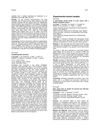Calcitriol and metformin together are more effective for treating PCOS and lowering MCP-1 than metformin alone.
May 2003 in “Journal of clinical oncology” [object Object]  7 citations,
June 2016 in “Bone Research”
7 citations,
June 2016 in “Bone Research” A Chinese family had a child with a specific gene mutation causing vitamin D-resistant rickets, but the child improved with calcium and low-dose calcitriol.
151 citations,
June 2010 in “Endocrinology and metabolism clinics of North America” Two rare genetic diseases cause severe rickets in children due to defects in vitamin D metabolism.
107 citations,
March 2014 in “BoneKEy Reports” Mutations in the vitamin D receptor cause hereditary vitamin D-resistant rickets, leading to poor bone health and requiring high calcium doses for treatment.
 97 citations,
September 2006 in “Pharmaceutical Research”
97 citations,
September 2006 in “Pharmaceutical Research” No treatment fully prevents hair loss from chemotherapy yet.
 34 citations,
January 2018 in “International Journal of Dermatology”
34 citations,
January 2018 in “International Journal of Dermatology” Scalp cooling is the most effective FDA-approved method to prevent chemotherapy-induced hair loss, but more research is needed for other treatments.
 14 citations,
January 2008 in “Dermatology”
14 citations,
January 2008 in “Dermatology” Vitamin D made by the skin plays a role in immune defense and skin health, and more research is needed to understand its full effects.
8 citations,
November 2010 in “British journal of dermatology/British journal of dermatology, Supplement” Vitamin D protects skin cells from damage caused by captopril.
7 citations,
May 1985 in “Archives of dermatology” Vitamin D is important for more than just bone health.
 6 citations,
May 2008 in “Current Opinion in Oncology”
6 citations,
May 2008 in “Current Opinion in Oncology” 2007 research improved understanding of prostate cancer risk, diagnosis, and treatment, but also showed the need for personalized treatment and further study on certain therapies' risks.
 4 citations,
March 2023 in “Current Oncology”
4 citations,
March 2023 in “Current Oncology” Scalp cooling is the only FDA-approved method to prevent hair loss from chemotherapy, but other treatments like minoxidil and PRP are being tested.
 3 citations,
November 2021 in “World Journal of Clinical Pediatrics”
3 citations,
November 2021 in “World Journal of Clinical Pediatrics” Vitamin D might help treat some types of hair loss, but more research is needed.
 1 citations,
May 2019 in “Journal of pediatric endocrinology & metabolism/Journal of pediatric endocrinology and metabolism”
1 citations,
May 2019 in “Journal of pediatric endocrinology & metabolism/Journal of pediatric endocrinology and metabolism” Intravenous calcium therapy is a safe and effective treatment for a rare type of rickets.
 January 2023 in “International Journal of Contemporary Pediatrics”
January 2023 in “International Journal of Contemporary Pediatrics” A rare genetic disease causes rickets and often hair loss in young children, which can improve with specific treatments.
 July 2018 in “Elsevier eBooks”
July 2018 in “Elsevier eBooks” Some drugs can cause reversible hair loss, but certain chemotherapy drugs may lead to permanent hair loss; drugs can also change hair color and texture.
 April 2018 in “Journal of Investigative Dermatology”
April 2018 in “Journal of Investigative Dermatology” Nonmelanoma skin cancers have higher levels of certain osteopontin variants than normal skin.
[object Object]  October 2004 in “Radiotherapy and oncology”
October 2004 in “Radiotherapy and oncology” Active vitamin D3 might protect hair follicles from radiation damage.
![Distribution of 1,25-Dihydroxyvitamin D3[22-Oxa] In Vivo Receptor Binding in Adult and Developing Skin](/images/research/d9b990e6-6243-4abe-b868-68801a5844f7/small/35023.jpg) 15 citations,
January 1995 in “Archives of dermatological research”
15 citations,
January 1995 in “Archives of dermatological research” OCT binds strongly to hair sheath cells and may affect skin and hair growth with fewer side effects than vitamin D3.
 June 2020 in “The journal of investigative dermatology/Journal of investigative dermatology”
June 2020 in “The journal of investigative dermatology/Journal of investigative dermatology” Topical treatments led to hair regrowth in a man with linear morphea.
148 citations,
October 2008 in “The journal of investigative dermatology/Journal of investigative dermatology” Mice without the vitamin D receptor are more prone to UV-induced skin tumors.
96 citations,
August 1995 in “Bone” Vitamin D3 is important for bone health and may help treat various diseases beyond bone-related conditions.
 82 citations,
April 1981 in “Clinical endocrinology”
82 citations,
April 1981 in “Clinical endocrinology” A girl with rickets and hair loss was found to have a rare condition where her body didn't respond to vitamin D treatment.
 50 citations,
October 1986 in “European journal of pediatrics”
50 citations,
October 1986 in “European journal of pediatrics” A boy with severe Vitamin D-resistant rickets did not respond to treatment and lacked a common symptom, suggesting a need for alternative treatments.
31 citations,
September 2003 in “International Journal of Dermatology” Vitamin D-dependent rickets Type II causes bone problems and hair loss, and doesn't improve with Vitamin D treatment.
23 citations,
October 2009 in “Gastroenterology” Vitamin D is crucial for bone health and preventing serious diseases.
23 citations,
April 1996 in “PubMed” Vitamin D3 and parathyroid hormone-related peptide may have important uses in skin treatments.
20 citations,
May 2007 in “JDDG Journal der Deutschen Dermatologischen Gesellschaft” Etanercept effectively treated a severe skin condition when other treatments failed.
 6 citations,
August 1989 in “European journal of pediatrics”
6 citations,
August 1989 in “European journal of pediatrics” Child with rickets improved with a specific vitamin D therapy, but alopecia did not change.
November 2023 in “Biomolecules” The research showed that Vitamin D and its receptor are important for healthy bones and normal hair and skin in rats.












![Distribution of 1,25-Dihydroxyvitamin D3[22-Oxa] In Vivo Receptor Binding in Adult and Developing Skin](/images/research/d9b990e6-6243-4abe-b868-68801a5844f7/small/35023.jpg)



